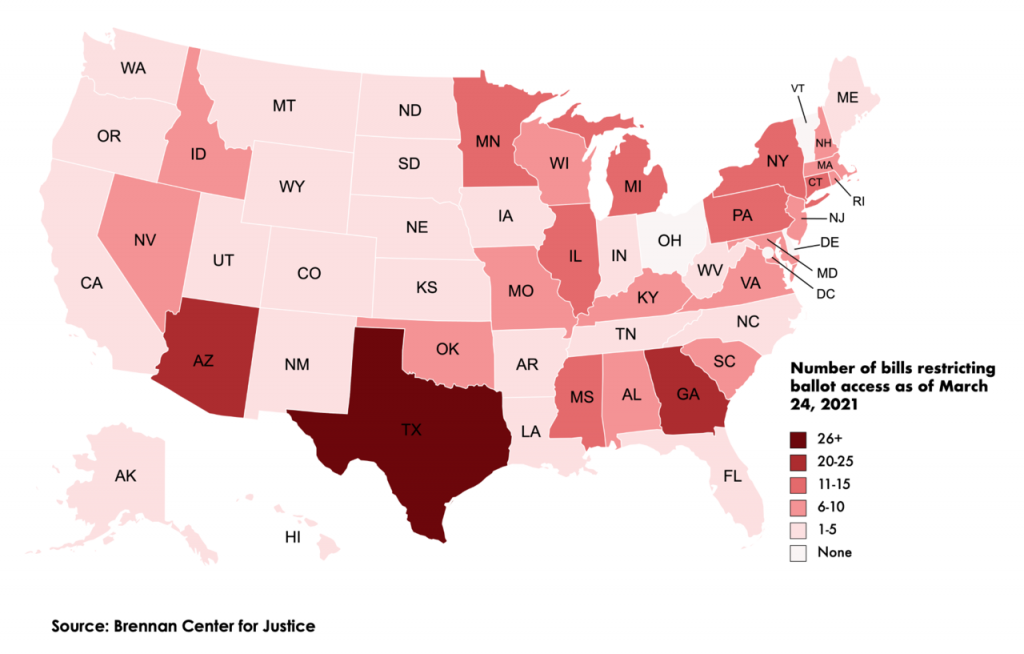It’s August, the month traditionally associated with the end of summer and back-to-school activities. But did you know that August is also noteworthy for its pivotal role in the history of voting rights in the United States? In fact, over the years, so much landmark legislation has been passed in August that it is unofficially known as Voter History Month.
On August 18, 1920, Congress ratified the 19th Amendment to the Constitution, giving women the right to vote. In practice, though, many women were denied access to the polls despite the new law. Native American women did not receive the right to vote until decades after the passage of the 19th Amendment. Although Native Americans were granted full citizenship in 1924, individual states determined whether they could vote. It wasn’t until 1948, when Arizona changed its Constitution to grant voting rights to Native Americans and other states quickly followed suit, that our nations’ original inhabitants enjoyed this fundamental right.
Deeply ingrained racist practices also meant that Black women and men were often denied the opportunity to exercise their voting rights. Black men had been legally able to vote since the passage of the 15th Amendment in 1870, but intimidation and suppression of their votes were rampant. Black women experienced the same discrimination once they also had the legal right to vote.

Dr. Martin Luther King, Jr., at the March on Washington, August 28, 1963. Photo courtesy of The LIFE Picture Collection.
Another important August event in voter history took place on August 28, 1963, when 250,000 people gathered in front of the Lincoln Memorial to draw attention to the inequities experienced by Black Americans. The March on Washington for Jobs and Freedom is where Dr. Martin Luther King, Jr., delivered his soaring “I Have a Dream” speech. While not technically a voters’ rights event, the march catapulted civil rights issues into the national consciousness, which ultimately led to the most significant August day in voter history to date.
On August 6, 1965, the Voting Rights Act became the law of the land, and non-white voters finally had the legal recourse necessary to fight discriminatory voting laws.
Considered one of the most significant pieces of civil rights legislation, the Voting Rights Act of 1965 made it illegal for local or state governments to impose any practices that would disproportionately restrict Black Americans’ access to the polls.
The act provided for federal oversight of jurisdictions in which less than half of non-white adults were registered to vote, authorized the attorney general of the United States to investigate the use of poll taxes, and banned literacy tests.
However, enforcement of the Voting Rights Act was inadequate in some areas, such as the South, where the Black population was larger and potentially more politically powerful. The act has been modified several times through the years, initially expanding its protections and then, more recently, limiting them. In 2013, the Supreme Court ruled that federal oversight of the voting laws in specific jurisdictions was no longer constitutional.
This August finds us at another crossroads in voter history. According to the Brennan Center for Justice, so far in 2021, at least 18 states have enacted dozens of laws restricting access to voting and hundreds of other measures are under debate across the country.

Meanwhile, following the recent Supreme Court decision that allows new limits on what remains of the Voting Rights Act, Congress grapples with voter-related legislation. The For the People Act of 2021 passed the House of Representatives but was blocked in the Senate. Its proposals include automatic voter registration and national standards for mail-in ballots.
Another bill, known as the John Lewis Voting Rights Advancement Act, is currently under consideration in the Senate. One key component is that the civil rights division of the Justice Department would need to grant approval for certain types of election law changes at the state and local level.
Voter History Month is the ideal time to reflect on the importance of free and fair elections. After all, the right to vote is the hallmark of democracy. The key to preserving the strength of our nation is ensuring that we all have equal access to the polling place.
